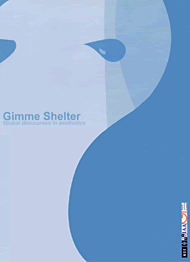GIMME SHELTER
Global discourses in aesthetics
University of Amsterdam
08.10.2009 bis 10.10.2009

GIMME SHELTER
Global discourses in aesthetics
8.–10. Oktober 2009
University of Amsterdam
Nieuwe Doelenstraat 16-18, 1012 CP Amsterdam
Organizing committee
Josef Früchtl (University of Amsterdam), Cornée Jacobs (Willem de Kooning Academy Rotterdam), Sybrandt van Keulen (University of Amsterdam), Jos de Mul (Erasmus University Rotterdam), Renée van de Vall (Maastricht University)
Topic of the conference
Globalisation is far more than an economic process; it affects social and cultural dimensions of life. Not only money and goods, but also people wander around and so do images, sounds and texts. The corollary of these globalisation processes is the tendency to seek shelter, as it were, in the supposed stability of traditionally defined identities and beliefs. It can be questioned whether traditional cultures were ever closed and homogeneous, territorially defined wholes; through contemporary media, however, the geographical boundaries between cultures seem to dissolve rapidly in favour of other, less clear-cut ones defined by religious, political or life-style preferences. Internet, in particular, has enabled dissemination of professional and amateur cultural production and consumption on an unprecedented scale, providing new venues of cultural exchange but also fostering new types of cultural conflict. Local cultures are increasingly being affected by global processes, but the global might acquire different meanings in different localities.
In this context, the discourses of aesthetics and philosophies of art need to face some central questions. How do artistic practices and aesthetic experiences change in response to these developments and how are these changes adequately articulated theoretically? When reflections on the significance of art and aesthetic experiences can no longer pretend to be universal, is there still a possibility to lay claim on a wider validity than merely that of one’s particular culture? What type of vocabulary allows for mutual dialogical or even polylogical exchanges and understandings when different traditions meet, without obliterating local differences? Is there a possibility for a creative re-description of globalization? And is there a meaning of ‘the global’ that cannot be reduced to universalism and unification? Can we seek shelter in a legitimate way?
Sponsored and organised by:
ASCA, Amsterdam School for Cultural Analysis
DGÄ, Deutsche Gesellschaft für Ästhetik
DAF, Dutch Aesthetics Federation
IAA, International Aesthetic Association
NGE, Nederlands Genootschap voor Esthetica
UvA, University of Amsterdam
